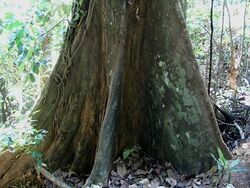Biology:Hopea beccariana
| Hopea beccariana | |
|---|---|

| |
| Base of trunk | |
| Scientific classification | |
| Kingdom: | Plantae |
| Clade: | Tracheophytes |
| Clade: | Angiosperms |
| Clade: | Eudicots |
| Clade: | Rosids |
| Order: | Malvales |
| Family: | Dipterocarpaceae |
| Genus: | Hopea |
| Species: | H. beccariana
|
| Binomial name | |
| Hopea beccariana Burck[2]
| |
| Synonyms[2] | |
| |
Hopea beccariana is a species of tree in the family Dipterocarpaceae. It is named for the Italian botanist Odoardo Beccari.[3]
Description
Hopea beccariana grows up to 45 metres (150 ft) tall, with a trunk diameter of up to 1.6 m (5 ft). It has buttresses. The bark is fissured. The leathery leaves are ovate and measure up to 8 cm (3 in) long. The inflorescences measure up to 8 cm (3 in) long and bear up to five cream flowers.[3]
Distribution and habitat
Hopea beccariana is native to Thailand, Peninsular Malaysia, Sumatra and Borneo. Its habitat is in dipterocarp forests and on coastal hills, at elevations of 150–1,200 m (500–3,900 ft).[1]
Conservation
Hopea beccariana has been assessed as vulnerable on the IUCN Red List. It is threatened by conversion of land for agriculture and by logging for its timber. The species is found in some protected areas.[1]
References
- ↑ 1.0 1.1 1.2 Ly, V.; Nanthavong, K.; Pooma, R.; Luu, H.T.; Barstow, M.; Vu, V.D.; Hoang, V.S.; Khou, E. et al. (2017). "Hopea beccariana". IUCN Red List of Threatened Species 2017: e.T33082A2832334. doi:10.2305/IUCN.UK.2017-3.RLTS.T33082A2832334.en. https://www.iucnredlist.org/species/33082/2832334. Retrieved 15 November 2021.
- ↑ 2.0 2.1 "Hopea beccariana". Royal Botanic Gardens, Kew. http://powo.science.kew.org/taxon/urn:lsid:ipni.org:names:320851-1. Retrieved 1 September 2021.
- ↑ 3.0 3.1 Ashton, P. S. (2004). "Hopea Roxb.". in Soepadmo, E.; Saw, L. G.; Chung, R. C. K.. Tree Flora of Sabah and Sarawak. 5. Forest Research Institute Malaysia. pp. 149–150. ISBN 983-2181-59-3.
Wikidata ☰ Q3017084 entry
 |


